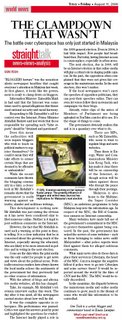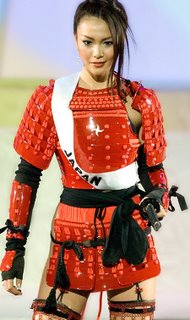Review: SonyEricsson K800i Cybershot
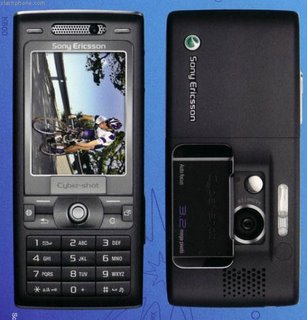 Like I mentioned in an earlier blog, I bought a new phone a couple of weeks ago. It's the SonyEricsson K800i. For a full list of specs, go to www.sonyericsson.com.
Like I mentioned in an earlier blog, I bought a new phone a couple of weeks ago. It's the SonyEricsson K800i. For a full list of specs, go to www.sonyericsson.com.
It's your everyday 3G phone (video calls), plays MP3s, MP4s, FM radio, Java applications and games, about 68MB of free phone memory (out of the box), a Sony Micro M2 memory card slot and a full featured personal assistant. Nothing special about the phone specs.
PROs:
It's got a big screen with very, very high resolution. At least as good as the later N series phones or PDAs, if not better.
The 3.2 megapixel autofocus camera is excellent. Lots of people have been raving about the Cybershot branding and my feeling is that it's not undeserving of the praise. It has the best flash for a cameraphone yet. A real xenon flash, same as those used in regular cameras instead of the usual LED flash.
The 1st picture is of my 2 previous phones, taken at 1 megapixel resolution using the K800i - in a darkened room with flash. The next picture is the K800i, taken at 1 megapixel resolution using the Samsung D500C - in the same room with flash. Huge difference in quality.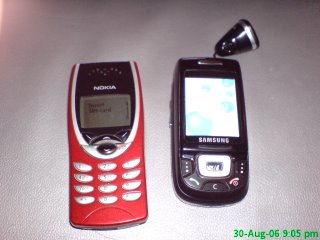
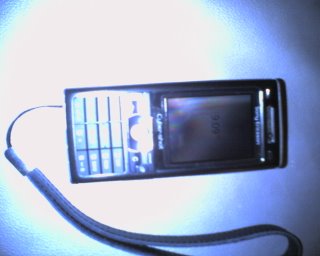 CONS:
CONS:
The big superb screen, xenon flash and autofocus camera does have its drawbacks. Firstly it's a porker at 115gms. My Nokia 8210 and Samsung D500C are about 80gms each. Makes a huge noticeable difference sliding around in your shirt pocket.
Secondly, the life of the 900mA battery is horrendous. With heavy use, be prepared to recharge daily. Used like a normal phone with occasional photoes, mp3, games etc, you'll be doing well if you squeeze ~2-3 days from it. If you're thinking about using a 2nd battery, forget about it. The battery cover is so tight that I've not managed to remove it since I bought the damn phone (the sales chick put my simcard in for me).
But the smart charging (controlled by the phone's software) is good. It charges very rapidly initially (confirmed by a travel charger that becomes hot to the touch) and only takes about 15 minutes to reach 50%. Then it cools off (literally), taking another 1.5-2 hours to fully charge.
Then you have the proprietry Sony Micro M2 memory card. It's brand new in the market, and like all new stuff and being Sony, it's expensive as hell. About USD 100 for 512MB and the 1GB card is not even available yet.
Lastly, the phone doesn't seem as robust (in a touchy feely sense) as my other phones. In just 2 weeks of usage, I've managed to scratch the screen (no friggin idea how that happened, but I've now pasted a plastic screen protector on it) and my thumbnail somehow managed to delaminate the top layer on one of the soft keys (#5) during an intense game of Java tennis. Now the key has sort of a 'blister' on it. And although the build quality is excellent, you'd really don't want to drop it on the floor. I just don't think it'll survive, but I might be wrong since this is my first SonyEricsson.
OVERALL:
I still love the phone. The camera is priceless, especially for someone like me who flatly refuses to pocket both a phone and a camera. I've been taking fuzzy pictures or none at all for years due to my stubbornness. No more, with the K800i's excellent camera.
A plus point is that there's very little delay between pressing the button and the shutter activation. Almost as fast as a normal digital camera and wayyyyy, wayyyyyy faster than the D500C and any N series I've tested. You also get the Bestpic functionality (which takes 9 photos in rapid succession) and sport mode for taking quick pictures. Auto focus and one button adjustment for landscapes, portraits, night shots, documents etc make it really user friendly.
If you can't make up your mind, here's a review comparing the K800i with other 3.2 or above megapixel phones, N73, Samsung D900, LG KG920 plus the newest N93 which is marketed as a Videocam-phone.
Also, here's an interesting comparison between a 3.2mp K800i with 2 "regular" cameras with typical huge megapixels - a 8mp and a 12mp Canon. Finally here's a pic of the chickadee who sold me the phone at Carrefour Hypermarket. Taken with a K800i held by sweaty hands, at 3 megapixel resolution, with donno what settings right out of the box.
Finally here's a pic of the chickadee who sold me the phone at Carrefour Hypermarket. Taken with a K800i held by sweaty hands, at 3 megapixel resolution, with donno what settings right out of the box.







